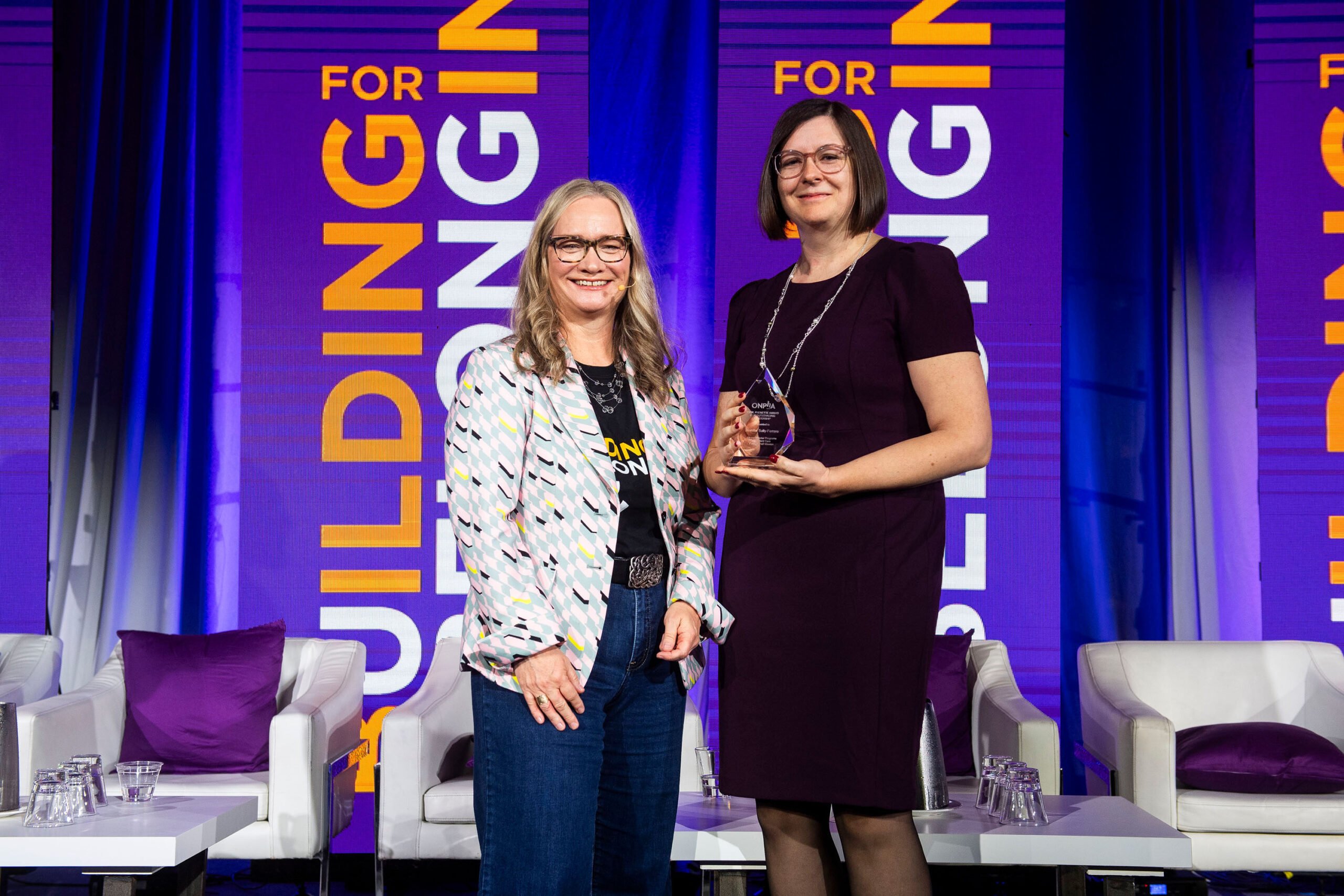EHM’s Senior Director of Programs and Client Care recently won an award for her leadership during a 2021 merger between EHM and Portland Place, a small, 45 unit housing provider. Jennifer was recognized in particular for how she engaged staff and clients throughout the whole process. We sat down with Jennifer to hear more behind her strategy.
What motivated EHM and Portland Place to merge?
It’s become really hard for small housing providers to succeed in the current climate. It certainly wasn’t easy to build housing like Portland Place in the 1990s, but a lot has changed since then. Portland Place is aging and it just needed a lot more maintenance and upkeep than it used to. Building supplies and utilities have been skyrocketing. Property standards have become more complex. Tenancies are also looking different. Tenants are aging and need more supports for their physical and mental health, but there are fewer and fewer places for them to go once they need more advanced care. We spend a lot of time supporting tenants to “Age in Place”, but that requires a lot of advocacy and navigating complex systems.
Simply put, managing social housing is just more difficult, costs more money, and is too much to be run with a skeleton staff and volunteers, no matter how skilled they are. The former Portland Place Board of Directors was putting in hundreds of volunteer hours trying to keep things running, and it still wasn’t enough. We saw so many things we could do in a way that was more cost-effective, and in less time. And more importantly, we could extend our social and spiritual care programs to tenants to help break isolation. When the Boards met to talk about it, it just made sense.
How did the two organizations decide that this was a good fit?
That’s such a great question because that’s when a lot of mergers run into conflict and get stuck. Something small housing providers like Portland Place pride themselves on, is the personal touch that a smaller or medium sized provider can give. They don’t want tenants to become a unit number, and they also don’t want tenants to pushed out if they start to struggle with their rent.
We listened to the board and staff of Portland Place and saw how much they cared, and how much they invested in helping tenants be successful, even when tenants hit rough patches financially, or maybe experienced health issues that kept them from maintaining their tenant obligations. The visionaries behind Portland Place created it to be a “Forever Home”, and wanted to make sure tenants could live there as long as they possibly could. They also worked hard to create a sense of community and “found-family” among tenants. So we tried to show the board and staff that we heard these messages, and gave examples of how we would honor this vision – and more.
What was the biggest challenge that you faced during the merger?
COVID was really hard on staff and tenants. The mental health of tenants had declined a lot, and a many were struggling with keeping their homes free of garbage and pests. We discovered that a lot of community supports that used to go into tenants’ apartments to help them with cleaning and cooking, had stopped during COVID. Some tenants had stopped seeing their health care providers. We assessed the tenants in most distress and built a plan for each one. For some, we advocated to get them into long-term care. For others, we were able to advocate to get their Personal Support Workers and cleaners back into their apartments, and reconnected them with their doctors. But this work took hundreds of hours. A group of volunteers and a small staff team would never have been able to do that.
What did you do to make the transition smooth for tenants?
We really listened to tenants. What was important to them? What are they worried about? We tackled the problems that they identified first and that built a lot of trust. We also understood that change is hard, so we communicated a lot. We would let tenants know when a change was coming well ahead of time, explained why it was needed, and how it would lead to something positive. We gave them time to process it, and time to talk to staff and management about their hopes and fears.
You mention in your award video that you engaged staff – can you tell us more about that?
Change is hard on staff as well, even if it’s positive. It’s hard to start doing something differently when you’ve been doing it one way for a long time. It’s really important to give staff the chance to help plan the rollout of a new program or policy. We would give them the opportunity to understand and process new programs and come up with their own ideas for how to roll it out. They also knew which tenants would struggle a bit more, and they would reach out and support them through it. The mental health of staff has always been a priority, and a lot of the changes we put in place gave them relief and space to breathe. Our goal was to release staff of the responsibility of taking work home with them. Work life balance is a core value of EHM, and is something really positive we could offer Portland Place staff with a merger.
What advice would you give to agencies considering a merger?
Mergers was a theme throughout the entire ONPHA conference. Small housing providers built in the 90s are experiencing the same things all over the province – there are fewer volunteers to sit on boards, volunteers are exhausted, the work is getting more complicated and at the end of the day, it’s just too expensive. If your agency is struggling it’s not because the staff aren’t skilled or because the volunteers aren’t putting enough hours in, it’s just because the economics don’t work anymore. Considering a merger is the leadership and vision that is needed right now for a lot of agencies. And I think we have shown that it is possible for a merger to balance the books AND keep the sense of community and personal touch that make small agencies so caring and powerful.

